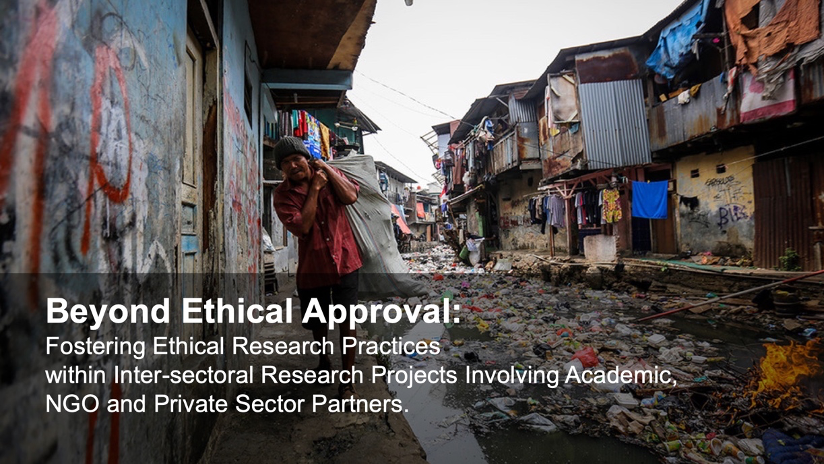
Abstract:
While research and innovation collaborations between NGOs and academic organisations can create considerable synergies with positive effects for the humanitarian sector, the inter-sectoral nature of such collaborations can generate challenges due to the varying mandates, objectives and ways of working of the organisations involved. By drawing on the experiences of a 4-year project involving a consortium of academic and NGO partners, this paper outlines three broad and inter-related ethical challenges that such projects can encounter and how they can be practically negotiated. Firstly, how are the knowledge-generation requirements of such projects addressed without engaging in the mere extraction of data from participants?
Secondly, how are potential risks to participants arising from their participation balanced with the need to include their voices within the research project? Finally, how are the formal requirements laid down by institutional review committees, primarily within academic organisations, to be adhered to within field contexts in which there are well-established expectations and ways of working on the part of NGO partners and beneficiaries? While these dilemmas are merely illustrative of the potential ethical dilemmas that inter-sectoral collaboration might encounter, the paper highlights that ethical dilemmas ought to be addressed reflexively by all stakeholders in order to facilitate improved collaboration and, ultimately, better quality, more relevant and more ethically informed research.
Authors:
Ronan McDermott, Pat Gibbons, Desire Mpanje: Centre for Humanitarian Action, School of Agriculture and Food Science University College Dublin, Dublin 4, Ireland
Sinéad McGrath: School of Politics and International Relations, University College Dublin, Dublin, Ireland
Anne Markey: School of Agriculture and Food Science, University College Dublin, Dublin, Ireland
Pablo Cortés Ferrandez: Pedro Arrupe Institute of Human Rights, University of Deusto, Bilbao, Spain
Dini Haryati, Nur Azizah: Yayasan Cipta, Jakarta, Indonesia
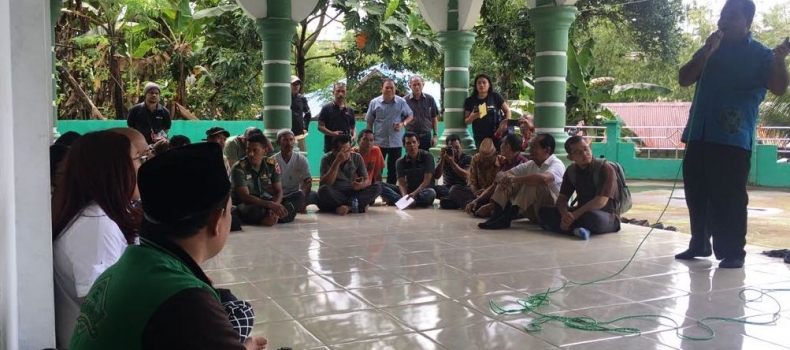
The Importance of Advocacy to Revitalize Family Planning in Ambon
Background: Modern Contraceptive Prevalence Rate in Ambon 2016 was high (75.40%), it was still dominated by short-term methods, while proportion of long-acting and permanent methods was 25.35% (BKKBN, 2016). Increased use of LAPMs is highly effective methods with lower discontinuation rates would prevent unintended pregnancies. January 2016, the President launched Kampung KB program that aims to help underprivileged village communities improve their quality of life. However, securing commitment from policymakers at the local level is a major barrier to revitalize FP. Effective local advocacy is necessary in order to increase commitments.
Program Intervention: Advance Family Planning initiative, funded by the Bill & Melinda Gates Foundation, began in Ambon City in June 2016. Through AFP, Yayasan Cipta convened key stakeholders from various sectors to form a district/city working group (DWG). DWG implemented advocacy activities among city-village level decision-makers. Activities included SMART advocacy capacity building, advocacy meetings, and sharing meeting. In 2018, Cipta continued strengthen Kampung KB implementation funded by FP2020 RRM.
Results: DWG’s advocacy meetings resulted mayor’s commitment and stakeholders to support FP. City fund allocation for FP experienced increase in 2017 (35%), 2018 (42%) and 2019 (33%). The fund utilized for demand creation, CTU training, and mobile FP service particularly LAPMs. In 26 September 2016, 36 clinics signed MoU on improving FP service particularly LAPMs. In early 2017, the mayor issued endorsement letter on village fund allocation to support FP at village level. Around $52,268 (2017), $74,317 (2018) and $83,095 (2019), village funds allocated to support cadres activities on FP and many activities in Kampung KB. City stakeholders also integrated their activities in Kampung KB. Overall, LAPMs coverage go up as well (40.05%) (BKKBN, 2019).
Program Implication/lessons: The implemented advocacy activities has succeeded in encouraging the commitment of mayor and village heads to support FP particularly LAPMs and Kampung KB. Improving support, the leader in each level and collaborate stakeholders were important factors to the success of advocacy to revitalize FP in decentralized Indonesia.
Authors:
Yeni Tri Herwanto, Dini Haryati, Inne Silviane, Yuniar Megasari, Nur Azizah: Yayasan Cipta
Juliana W. Patty: Ambon City Family Planning Office/District Working Group
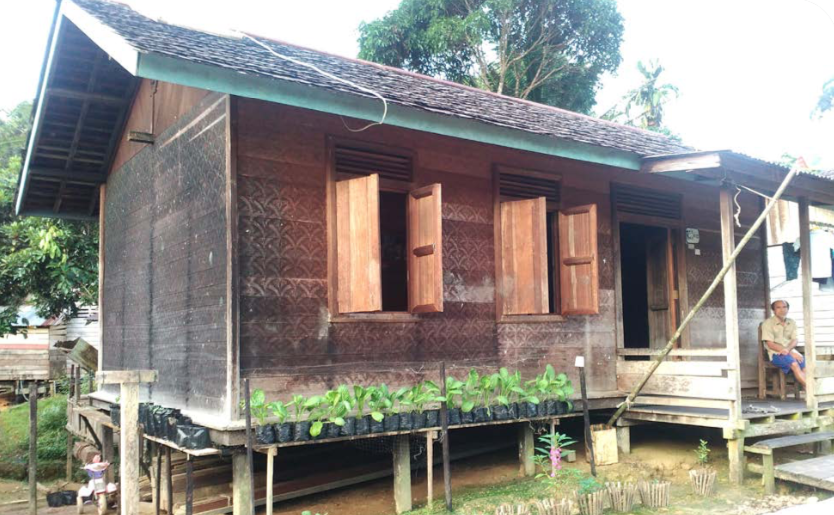
Making an Impact: Advocacy to Increase Village Funds for Strengthening Kampung KB in Kuningan District
Background: In January 2016 the President launched the Kampung KB program which aims to help underprivileged village communities improve their quality of life and welfare through family planning and family development programs that are synergized with other cross-sector programs such as health, education, environment, etc.
Program Intervention: Yayasan Cipta with supports from Advance Family Planning and FP2020 through Rapid Response Mechanism project has been working to strengthen Kampung KB for the past four years with Kuningan’s District Working Group (DWG). The DWG advocates local decision makers to increase program budgets and policy support related KKBPK program. The DWG also advocates cross-sector stakeholders at the district and village levels to gain support and their contribution to Kampung KB, including to form the Village Family Planning Team whose task is to advocate village leaders to alocate village funds for Kampung KB activities.
Result: Between 2016-2019, the head district of Kuningan issued two endorsement letters and one decree that supporting the implementation of Kampung KB. In 2016, only 5 villages allocated in total 84 million IDR village funds for Kampung KB, 14 villages (2017) allocated 483 million IDR, 45 villages (2018) allocated around 1.8 billion rupiah and 46 villages (2019) allocated around 3 billion IDR.
Program Implication/Lessons: In the decentralization era, district leaders play important role in navigating the district development and down to the village level, including Kampung KB. Therefore, their leadership and commitment become very crucial. However, with village fund policy from central government, the village governance also has authorities in leading the budget allocation according to the village’s needs. In case where there is a challenge in advocating FP or other social development issues to the district leaders, the advocacy process can be started bottom up, i.e. through the capacity strengthening on the village level, especially for the village stakeholders to be able to understand the issues, needs, potential, and the ability to translate it into a workplan. Hence, resulting in more solid and “organic” advocacy messages to the district leaders.
Authors:
Ika Christi S., Endang Achmad F., Nur Azizah: Yayasan Cipta
Usep Yusep, Uud Udiarsa: Kuningan District Family Planning Office/District Working Group
Anas: Kuningan District Health Office/District Working Group
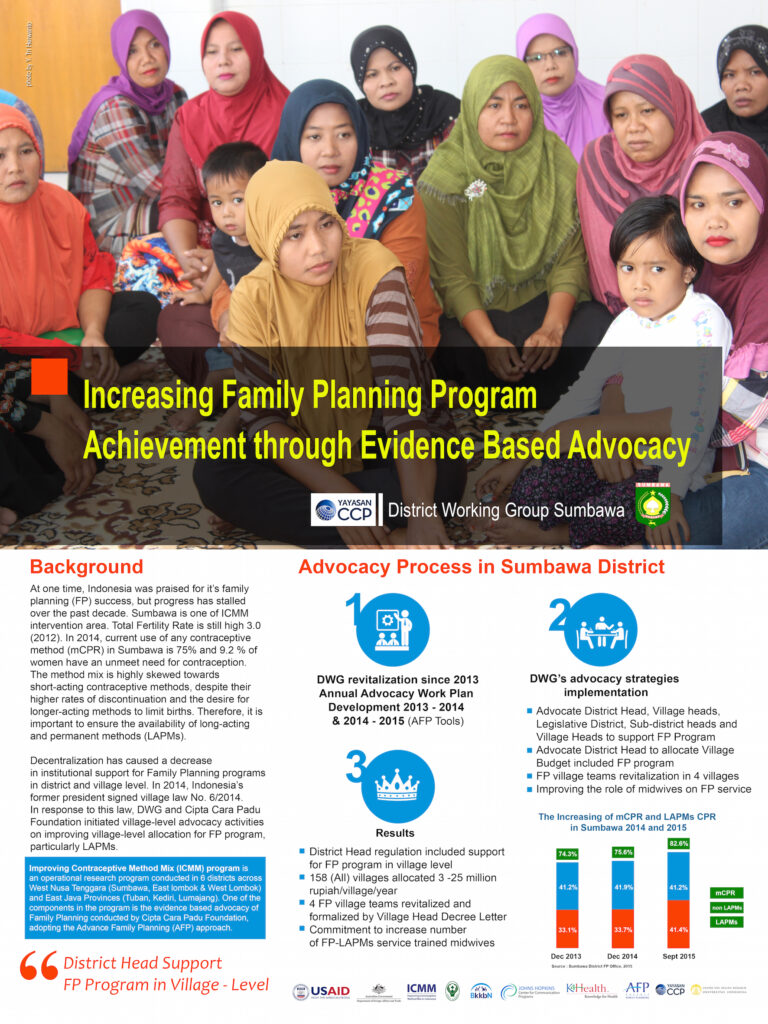
SMART Advocacy Approach Leads to Village Funds for Family Planning in Sumbawa
Background: Since decentralization was implemented in 2000s, Indonesia experience many obstacles in FP. It caused the decrease funds for FP at district and village. However, in 2014, GOI passed the first law regulating village’s authorities and funds for village development and community empowerment (Law no. 6/2014). In February 2015, Ministry of Village launched priority use of village funds regulation no. 21/2015 included health promotion. In light of this law, it is important to conduct effective advocacy to policymakers to ensure village funds also used for reinvigorating FP.
Program Intervention: In early 2013, ICMM project funded by USAID and DFAT implemented in Sumbawa. SMART (Specific, Measurable, Attainable, Relevant and Time bound) advocacy efforts are led by Yayasan Cipta in collaboration with Advance Family Planning (AFP) and JHCCP. In November 2016, Cipta continued on strengthening Kampung KB funded by FP2020 RRM. District working groups (DWGs) implemented SMART advocacy to increase support for FP among district, sub-district and village decision-makers. Activities included advocacy capacity building, meetings with stakeholder, knowledge sharing meeting and M&E.
Results: Sumbawa’s DWG members agreed that the low LAPMs prevalence rate (33,1%) than short-term methods is also caused by inadequate funding and lack capacity of FP field officers, cadres & midwives. Advocacy resulted district head regulation (2015) on village authority included promoting FP. DWG continued advocate sub-district and village policymakers. In early 2016, all sub-districts (24) and villages (157) formed FP team. Started 4 villages allocate $2,935 in 2015, then all villages allocated $112,810 (2016) and $185,371 (2017). DWG ensured FP still included in regulation revision 2017. Amount $166,165 (2018) village funds allocated to support demand generation and capacity building. The FP village team also integrated with 27 Kampung KB. Overall, LAPMs prevalence rates go up as well (45.4%) in 2018.
Program Implication/lessons: In the decentralized Indonesia, district-level government has an important role in linking village & district development planning as well as provincial and national development agenda. The implemented SMART advocacy encouraged commitment of district and village heads to optimize the village funds on supporting FP.
Authors :
Yeni Tri Herwanto, Dini Haryati, Inne Silviane, Nur Azizah: Yayasan Cipta
Muhammad Ikhsan: Sumbawa District Secretary/Head of District Working Group
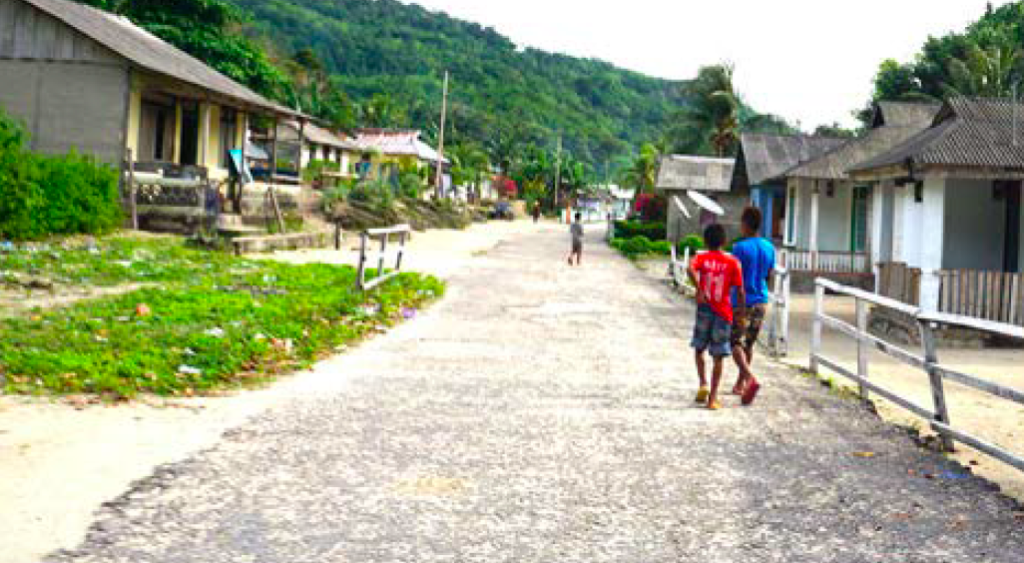
Archipelago based Family Planning: District-Level Advocacy in Tual, Maluku
Background: Tual City area consists of 66 islands and 98,7% area covered by sea. There is only 13 islands are inhabited by community. Archipelagic geography faces various problems on accessing FP services. The mCPR was low (54,8%), it was still dominated by short-term methods, while use LAPMs only make up 12.6% of the method mix in the mid 2016 (BKKBN, 2016). Increased use of LAPMs highly effective methods with lower discontinuation rates than short-acting methods would prevent unintended pregnancies as well as maternal and infant mortality Advocacy is necessary in order to address policy and funding barriers that limit access to contraceptives choices.
Program Intervention: Advance Family Planning (AFP) initiative, funded by the Bill & Melinda Gates Foundation, began in Tual city in the mid 2016 – October 2017. Yayasan Cipta encouraged district multi sector working groups (DWGs) to implement SMART advocacy addressing support for FP among decision-makers. Activities included SMART advocacy capacity building & work plan development, advocacy meetings, sharing meeting and M&E.
Results: As followed-up of the Lombok Joint Commitment in June 2016 that the local leaders pledge to prioritize FP in their local development agenda, Tual’s DWGs conducted advocacy. Advocacy resulted the mayor’s commitment on allocating city funds revision 2016 around $13,213 to support Contraceptive Technology Update (CTU) training, recording and reporting training and coordination meetings. The number of CTU trained midwives increased significantly. From 3 midwives in 2016, become 33 midwives in early 2017 (35.5% of total midwives). Trend of city funds allocation for FP increased 17.4% (2017) and 11.2% (2018). The funds utilization is mostly for demand generation and FP service in remote islands. The number of FP field officer also increased from 3 (2016) to 10 officers (early 2017) to manage FP activities at the village-level.
Program Implication/lessons: The SMART advocacy strategies developed and conducted by DWGs based on local issues and needs. The implemented advocacy activities succeeded on encouraging commitment of the mayor and stakeholders to optimize the local resources to improve FP demand generation and service in remote islands.
Authors :
Yeni Tri Herwanto, Dini Haryati, Inne Silviane, Nur Azizah: Yayasan Cipta
Enta Rego: BKKBN Maluku/Provincial Working Group
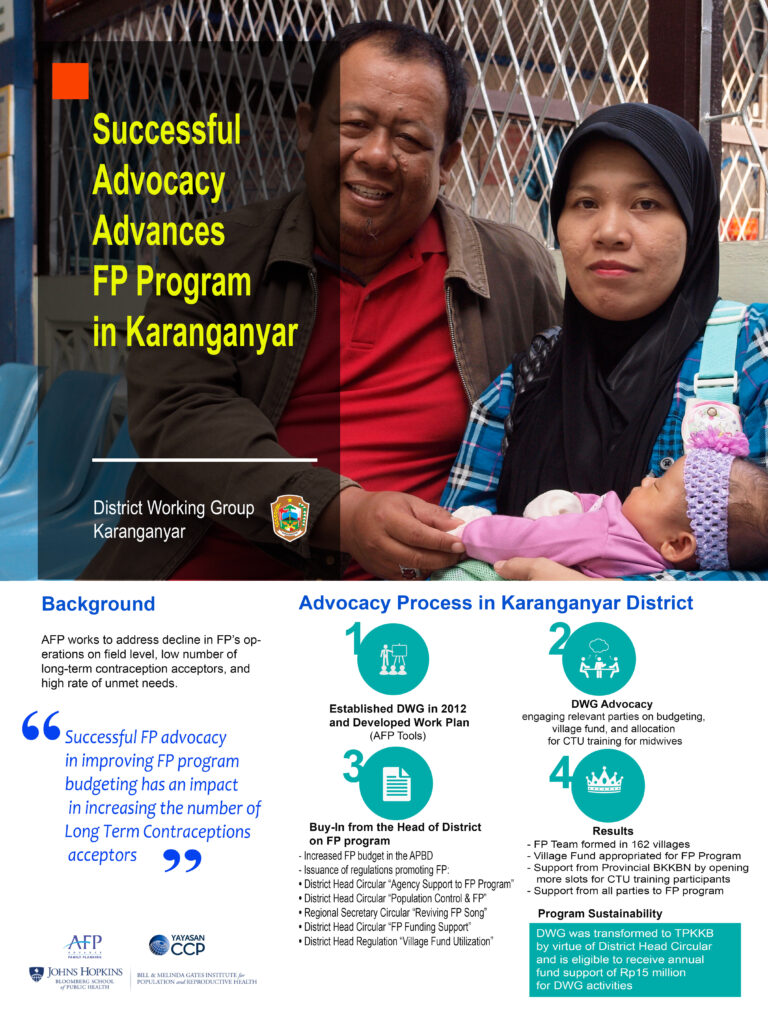
Village-level Advocacy to Revitalize Family Planning in a Decentralized Indonesia
Abstract:
While Indonesia was once hailed as a Family Planning success story, progress has stalled over the past decade. IDHS 2012 showed the Modern Contraceptive Prevalence Rate is stable at 58%, the method mix is highly skewed towards short-acting contraceptive methods, despite their higher rates of discontinuation and the desire for longer-acting methods to limit births. Unmet need persists at 11.4%. One explanation for this halted progress is decentralization, which began in Indonesia in the early 2000s. In general, decentralization has caused a decrease in institutional support for FP programs at the district and village levels. The number of FP field officers has also decreased significantly. However, in 2012, the Indonesian House of Representatives passed the ―Village Law No. 6/2014‖ to ensure that the central government transfers development funds directly to villages in order to fulfil basic needs. In light of this law, it is important to conduct advocacy at the village level to ensure that some of these village funds are used for reinvigorating FP programs.
In January 2015, Yayasan Cipta Cara Padu (YCCP) collaborated with 7 District Working Groups (Karanganyar, Lumajang, Tuban, Kediri, East Lombok, West Lombok and Sumbawa) began conducting advocacy among village policymakers with the goal of allocating village funds to support FP and revitalizing ―FP village team. This activity was conducted as part of Advance Family Planning (AFP) and Improving Contraceptive Method Mix Project (ICMM).
This program shows that, in the era of decentralization, advocacy among village-level policymakers allocate village budget for community mobilization on FP, increase availability and quality of FP services. It also shows that, regulations and dedicated funding to local working groups such as these can improve local buy-in and sustainability.
Oral presentation : The 4th ASEAN Academic Society International Conference – 2017
Authors:
Yeni Tri Herwanto, Dini Haryati, Sri Supiaty : Yayasan Cipta
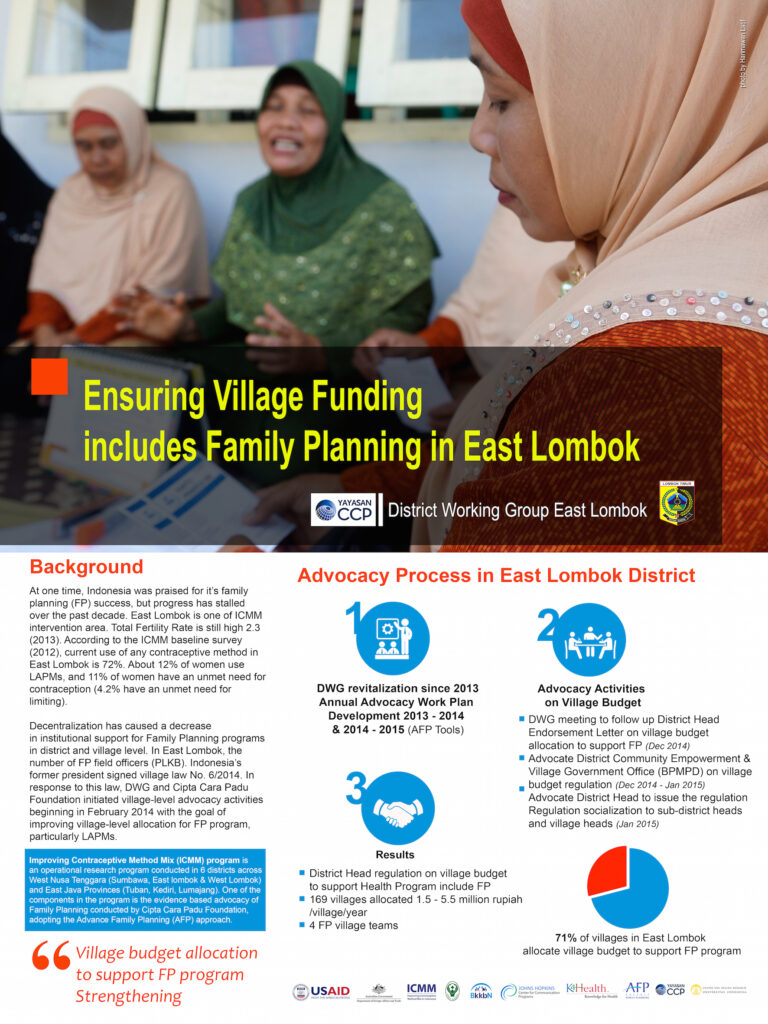
Community‐Level Advocacy in Indonesia: Ensuring that Village Funding includes Family Planning
Background
At one time, Indonesia was praised for it is family planning (FP) success, but progress has stalled over the past decade. Although the modern contraceptive prevalence rate is still high at 58%, the method mix is highly skewed towards short‐acting contraceptive methods, despite their higher rates of discontinuation and the desire for longer‐acting methods to limit births. Therefore, it is important to ensure the availability of long‐acting and permanent methods (LAPMs). While it is difficult to advocate for family planning commitment at the community level in the era of decentralization, a recent law has brought hope: In January 2014, Indonesia’s former president signed the Village Law No. 6/2014, the first law specifically regulating funding to villages. This law was intended to help communities assume greater responsibility and control over village affairs and be able to meet more of their development needs, including funding for FP programs . In response to this law, Yayasan Cipta Cara Padu (YCCP) — a local non‐profit advocacy and health communication organization in Indonesia —initiated village‐level advocacy activities beginning in February 2014 with the goal of improving village‐level allocation for FP programs, particularly LAPMs.
Poster presentation: International Conference on Family Planning – 2016
Authors:
Dini Haryati, Yeni Tri Herwanto: Yayasan Cipta Cara Padu
Farida Alfawati: Lumajang District FP Office
Suroto: East Lombok District FP Office

Successfully Leveraging Government Investment in Advocacy Capacity Building: An Indonesia Case Study
Abstract:
In 2001, Indonesia’s central government devolved many of its administrative and budgetary powers to provincial and district governments, including family planning (FP). This change, following a decline in overall funding for the National Population and Family Planning Board (BKKBN), resulted in stagnation in what was previously one of the world’s most successful FP programs.
From 2002 to 2012, the total fertility rate remained stagnant at 2.6 and the contraceptive prevalence rate increased marginally (1%) to 62% among married women. In the context of these reforms, districts struggled to identify health issues, prioritize health budgeting, and interpret local data to make evidence‐based decisions that improve programs. On average, Indonesia’s more than 500 districts only allocate between 0.04‐0.2% of their annual budget to FP.
In 2012, the government sought to revitalize FP, committing to the Family Planning 2020 (FP2020) partnership. This commitment has translated into action: the country’s FP allocation quadrupled from $65.9 million in 2006 to $263.7 million in 2014. BKKBN has used this investment—in collaboration with funds from others—to draw upon successful approaches and scale them up in provinces with the greatest needs. One such investment is a locally‐based advocacy approach
Poster presentation: International Conference on Family Planning – 2016
Authors:
Elfira Nacia, Inne Silviane: Yayasan Cipta Cara Padu
Mohamad Iqbal Apriansyah, Julianto Witjaksono: BKKBN
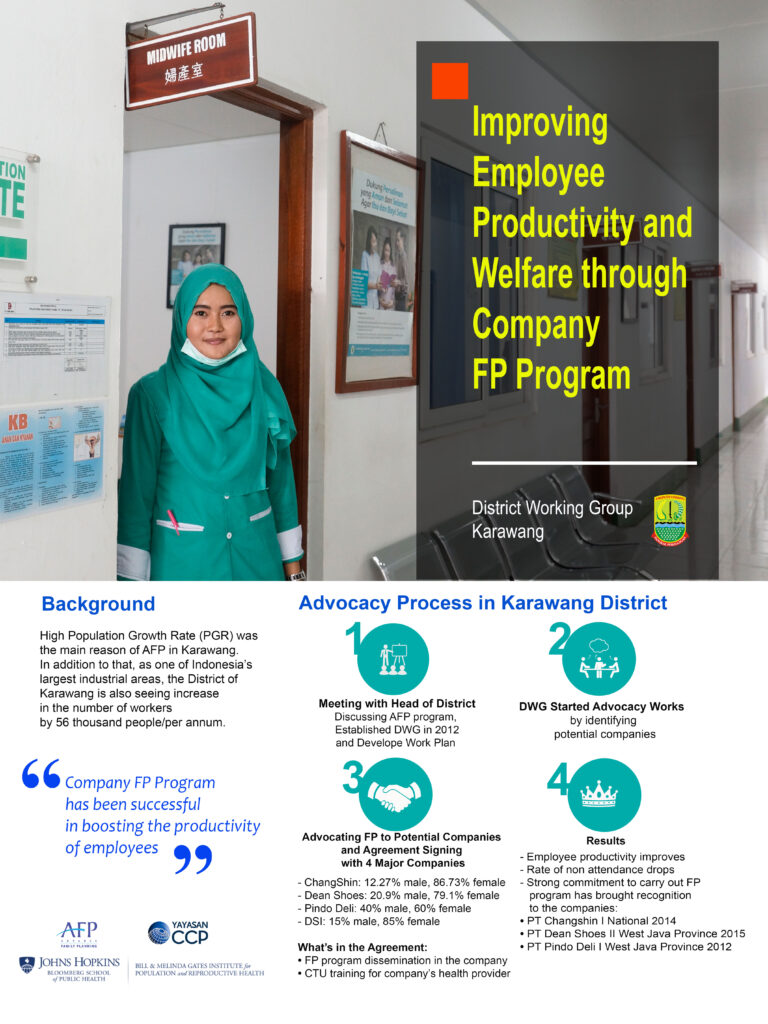
Revitalizing Family Planning in a Decentralized Indonesia: The Importance of Village level Advocacy
Background :
While Indonesia was once hailed as a family planning (FP) success story, progress has stalled over the past decade. While the modern contraceptive prevalence rate is stable at 58% , the method mix is highly skewed towards short‐acting contraceptive methods, despite their higher rates of discontinuation and the desire for longer‐acting methods to limit births. The maternal mortality rate is also high at 359 per 100,000 live births, and unmet need persists at 11.4%. One explanation for this halted progress is decentralization, which began in Indonesia in the early 2000s. In general, decentralization has caused a decrease in institutional support for FP programsat the district and village levels. The number of FP field officers (PLKB) has also decreased significantly. However, in 2012, the Indonesian House of Representatives passed the “Village Law No.6/2014”— to ensure that the central government transfers development funds directly to villages in order to fulfill basic needs. In light of this law, it is important to conduct advocacy at the village level to ensure that some of these village funds are used for reinvigorating FP programs, expanding the method mix, and more fully meeting the FP needs of women throughout the country.
Oral presentation : International Conference on Family Planning – 2016
Authors:
Yeni Tri Herwanto, Dini Haryati, Sri Supiaty, Elfira Nacia: Yayasan Cipta Cara Padu
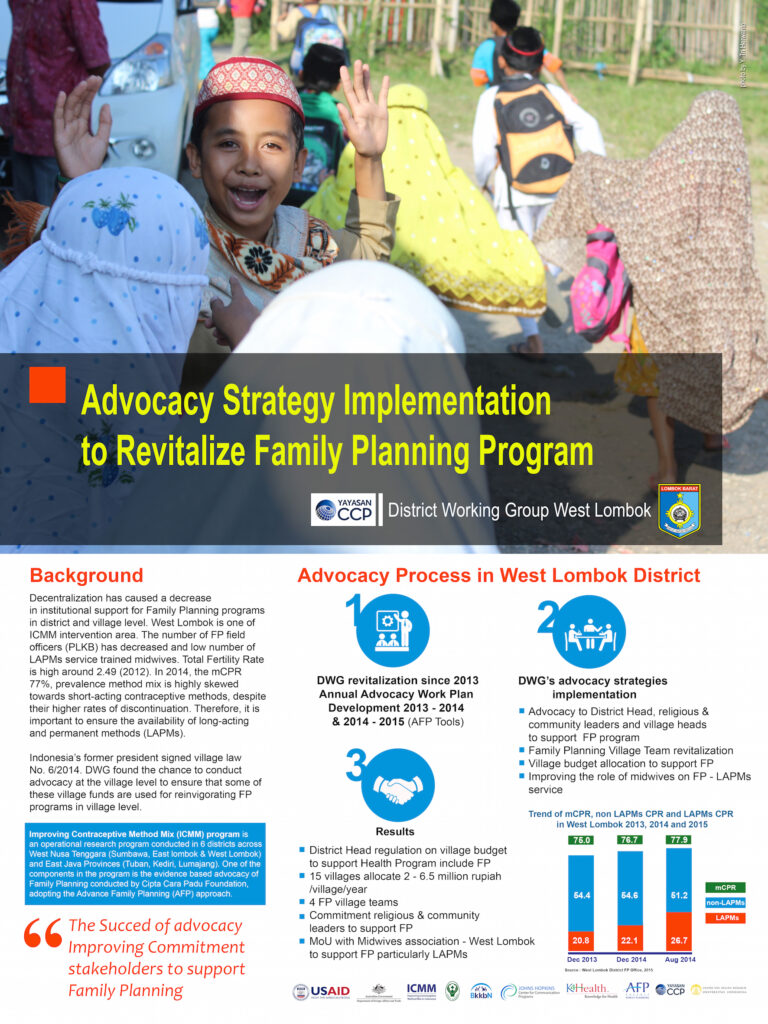
District‐level Advocacy to Ensure Sustainability of Family Planning Programs in West Lombok, Indonesia
Background:
The human development index (HDI) in West Lombok District, in the West Nusa Tenggara Province of Indonesia, is the third lowest in the entire province (63.2) . This is caused by low life expectancy at birth—which is influenced by high infant mortality and maternal mortality rates. While these trends are improving, there is still work to be done. Pregnancy risk factors in Indonesia are often referred to in bahasa Indonesia as “4 Terlalu”—too young, too old, too often and too short intervals in‐between pregnancies and these are closely related to high rates of maternal and infant mortality.
While West Lombok’s overall contraceptive prevalence rate is high—77% in 2014—it is still dominated by short‐term methods, while use of long‐acting and permanent methods (LAPMs) only make up 22% of the method mix. Increased use of LAPMs—highly effective methods with lower discontinuation rates than short‐acting methods—would prevent unintended pregnancies as well as maternal and infant mortality. However, securing commitment from various stakeholders at the district level is a major barrier to increasing LAPM availability and use. Effective local advocacy is necessary in order to increase commitments from district, sub‐district, and village heads.
Oral presentation: International Conference on Family Planning – 2016
Authors :
Yeni Tri Herwanto: Yayasan Cipta
Mohammad Abdullah: West Lombok District Health Office
- Multi Stakeholder Support on Improving The Achievement of Family Planning Program in Tuban – Pre-Conference Session of International Conference on Family Planning 2016
- Increasing Family Program Achievement through Evidence-Based Advocacy in Sumbawa – Pre-Conference Session of International Conference on Family Planning 2016
- 1 Billion Rupiah Village Budget Allocation to Optimize Family Planning Program in Lumajang – Pre-Conference Session of International Conference on Family Planning 2016
- Ensuring Village Funding Includes Family Planning in East Lombok – Pre-Conference Session of International Conference on Family Planning 2016
- Advocacy Strategy Implementation to Revitalize Family Planning in West Lombok – Pre-Conference Session of International Conference on Family Planning 2016
- Successful Advocacy Advances Family Planning Program in Karanganyar – Pre-Conference Session of International Conference on Family Planning 2016
- Pontianak is Committed to Continuously Promoting Family Planning – Pre-Conference Session of International Conference on Family Planning 2016
- Improving Employee Productivity and Welfare through Family Planning Program in Karawang – Pre-Conference Session of International Conference on Family Planning 2016
